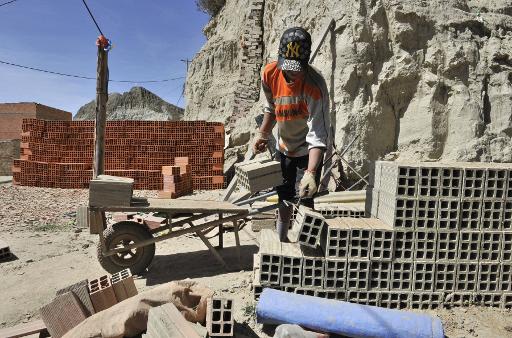*Bolivia's Congress has passed legislation to allow children as young age 10 to work as long as it does not interfere with their education and is done independently to help the child's family make ends meet.
Sergio has worked since he was eight years old. The teen has already spent half of his short life making bricks in a traditional factory in Alpacoma, a poor area on the outskirts of La Paz.
The legislation otherwise lowers the legal working age to 12 - again, as long the job does not interfere with the child's education.
A regional official with the UN International Labour Organisation, Carmen Moreno, said the legislation passed would make Bolivia the first country to make work by 10-year-olds legal.
Ms Moreno called the legislation worrisome considering that Bolivia is a signatory on a UN convention that sets 14 as the minimum age for child labour.
The Bolivian legislation is expected to be signed into law shortly by President Evo Morales.
----------Sergio has worked since he was eight years old. The teen has already spent half of his short life making bricks in a traditional factory in Alpacoma, a poor area on the outskirts of La Paz.
He leaves the workshop each day exhausted and covered in red dust but filled with pride at the thought of being useful to his family.
Of course, Sergio is totally unaware of the raging debate in Bolivia over child labor.
"I work to help my parents and buy myself things," the 15-year-old, wearing thick glasses that hide eyes damaged by the sun and harsh dust, told AFP.
Sergio can make as much as $57 a week in a country where the minimum wage for an adult is about $207 a month.1
That monthly wage is however more of an exception than the rule: most Bolivians do odd jobs off the books, and earn just a few coins here and there. For some working the family farm, they make nothing at all.
Child labor is considered a cultural norm in Bolivia, a landlocked South American (Frankfurt: SS7.F -news) country of 10 million.
The practice is so entrenched that in 2011, the Unatsbo union of young workers was created. The group campaigns for the regulation of child labor and abolition of a minimum age limit.
President Evo Morales, who himself worked as a shepherd in the Andean nation as a child, has shied away from raising that minimum age, saying that labor helps people to develop a "social conscience."
While Bolivia's constitution bans forced labor or the exploitation of children, it is not specific about what age defines a "child".
According to UNICEF, around 850,000 Bolivian children between the age of seven and 15 work under poor conditions.
Bolivia's labor ministry meanwhile maintains that 87 percent of those youths do dangerous work, notably in mines, brickyards or in the countryside during sugar cane harvest.
International conventions on child labor smash up against harsh reality in places like Bolivia -- Latin America's poorest country -- as well as Peru, Paraguay and Nicaragua, where thousands of children enter the labor market at an early age, driven by hunger and poverty.
- 'I like it' -
In 1997, Bolivia ratified the International Labour Organization's convention limiting child labor for those under 14, but the reality on the ground doesn't reflect that.
"El Chino" learned to repair tires at age eight. He now works at a shop in Pampahasi, a neighborhood in eastern La Paz, diligently measuring tire pressure.
"My dad is an auto mechanic and my mom puts my money in the bank," he said from his tiny workstation.
The small 13-year-old with surprisingly muscular arms says he "chose to work."
"I like it," he said, adding that he was "kicked out of school because I hit another boy. I haven't been back since."
His long-term goal is to become a mechanic. In the meantime, he says he fixes at least 100 tires a day.
About 13 million children work in Latin America and the Caribbean, according to the International Labour Organization.
The figure has sparked concern in the region, where children younger than 14 have barred from working for the last 40 years.
- Children 'need to work' -
In neighboring Peru, home to 30 million people, about 1.6 million children are at work -- in agriculture, brick-making and construction. More than 100,000 between the age of five and 12 work in mines.
"It's a real social problem that should be treated as such," said Jose Sanchez, director of the Movement of Adolescent and Child Workers, an organization that has defended their rights since 1976.
Despite the letter of the law, "many children need to work to be able to survive," he said.
A similar reality faces youth in Paraguay, where some of the toughest jobs, such as work in lime kilns and quarries, are carried out by children.
But "one of the worst forms of child labor is work in landfills," Eduardo Sosa, a government official who works on children's issues, told AFP.
In Central America's poorest country, Nicaragua, the government has launched a program called "Amor" (Love), which aims to pull children off the street and help their families.
In the country of 5.8 million, around 300,000 children and teens work, according to humanitarian organizations.
- www.unicef.org.uk/UNICEFs-Work/Our-
mission/Childrens-rights Cached
In 1989, governments worldwide promised all children the same rights by adopting the UN Convention on the Rights of the Child. These rights are based on what a child ... - www.unicef.org/crc Cached
Publications and information on the work of the United Nations Children's Fund and its advocacy for children's rights, survival, development and protection through ...


No comments:
Post a Comment